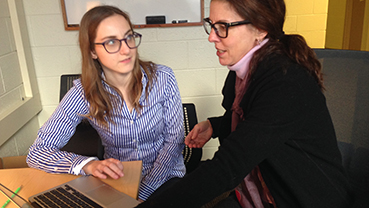Researcher Develops Resources to Promote Critical Thinking, Build Professional Skills with Epidemiology Writing Assignments

Ella August, clinical assistant professor of epidemiology at the University of Michigan School of Public Health, and James Trostle, professor of anthropology at Trinity College and professor of public health at the University of Chile, explore this question in the latest issue of the Journal of Public Health.
“Public health writing assignments can and should be more focused on student problem solving, flexible and critical thinking, and intercultural awareness,” August and Trostle argue in the article. “To construct better writing assignments, teachers of public health would benefit from knowing the types and content of writing that practicing professionals produce outside of graduate schools.”
Their article includes an Epidemiology Workplace Writing Repository, an open-source resource August created that epidemiology educators can use to support them in teaching writing and critical thinking skills. The teaching guide and materials within the repository are meant to support writing assignments that take best practices from the liberal arts and bring them into public health curriculum.
“I’ve thought a lot about the importance of having students write in authentic formats,” says August. “I sought out writing resources for my epidemiology classes and wasn’t able to find anything. So, I thought, I’m going to create them.”
When it comes to writing, August has a unique perspective. While she has a PhD in epidemiology and years of experience as a public health professor, she also has a bachelor’s degree in English and a master’s degree in writing.
“This is especially important because MPH epidemiology graduates are employed in diverse sectors, including government, health care, and the for-profit and nonprofit sectors,” says August. “Only about a quarter of graduates go on to work in academia.”
While August built this resource specifically for epidemiology professors and students, her hope is that the repository will serve as a model for other public health and STEM fields.
August and Trostle emphasize six features of effective writing assignments:
-
Give an explanation of expectations.
-
Specify the purpose and learning goals.
-
Allow for process, including brainstorming, multiple drafts and peer review.
-
Pose an authentic disciplinary problem.
-
State a specific audience for the piece.
-
Ask students to write in a disciplinary format rather than a more generic format.
“I want our students to understand how to communicate to different audiences—public health experts, health care providers, patients, the general public,” says August. “Good communication—and the critical thinking skills that come along with these types of writing exercises—is a vital component of public health.”
Funding for this project was supported by the University of Michigan Center for Research on Learning and Teaching.


